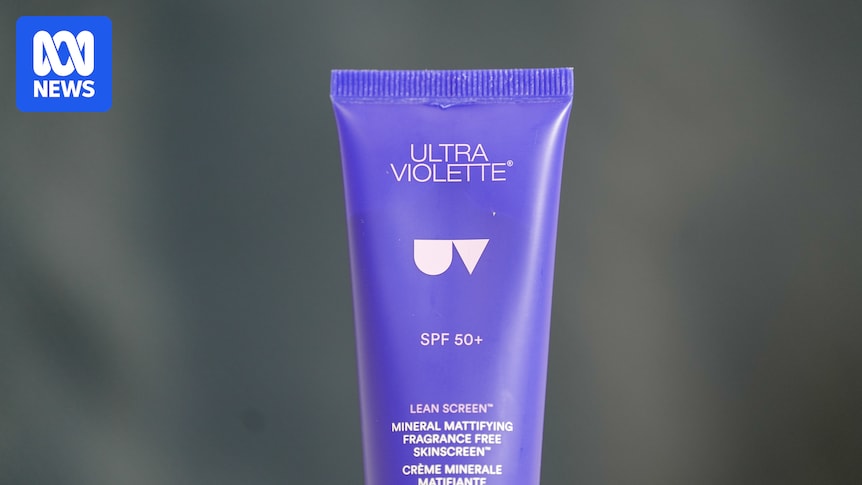Sunscreen brand Ultra Violette is withdrawing one of its well-known products from the market due to concerns about its sun protection factor.
The company announced on Friday it is voluntarily withdrawing the product after testing revealed it couldn’t guarantee the SPF 50+ on the label.
Testing by consumer group Choice earlier this year found 16 out of 20 popular sunscreen products failed to meet the SPF claim on their labels.
The worst performer was Ultra Violette’s Lean Screen SPF Mattifying Zinc Sunscreen, which came back with an SPF of just 4.
Ultra Violet’s Lean Screen SPF 50+ Mattifying Zinc Sunscreen returned an SPF of four according to CHOICE. (ABC News: Billy Cooper)
The company strongly defended its SPF testing at the time, publicly releasing the results of the testing it did to certify its SPF claims.
It also commissioned another test of the product at the same lab they had previously used.
Both of those test reports returned results of above SPF 60.
An ABC investigation revealed experts had flagged serious concerns about the results from the overseas testing lab it used — Princeton Consumer research.
Do you know more about this story? Email: rachelcarbonell@pm.me
Ultra Violette committed to doing additional testing on its product at alternative labs and on Friday released those results, many of which failed to meet the SPF 50+ claim.
In a statement it said, “We had multiple independent labs conduct new tests of Lean Screen.”
“This week, we received results from those tests that demonstrated significant and, candidly, atypical variability.
“Across eight different tests, Lean Screen has now returned SPF data of 4, 10, 21, 26, 33, 60, 61, and 64.”
The brand has confirmed they will no longer work with Princeton Consumer Research.
In a statement PCR told the ABC that “any results provided by Princeton Consumer Research (PCR) are based solely on the specific samples submitted to us at the time of testing”.
“Our reports accurately reflect the performance of those samples under controlled test conditions and in accordance with the relevant standards.”
Questions over lab’s sunscreen tests
Speaking directly to its customers, the Ultra Violette statement said, “[The result variability] wasn’t good enough for us, and it isn’t good enough for you.”
The company announced it is voluntarily withdrawing the product from the market effective immediately and apologised to its customer base.
“We are deeply sorry that one of our products has fallen short of the standards we pride ourselves on and that you’ve come to expect of us,” the statement said.
The same product is also being withdrawn in the US, where it is called “Velvet Screen”.
The brand was careful to point out the issue did not affect its other products.
“Unlike the majority of our range, Lean Screen was created by a third-party manufacturer and was the only sunscreen they made for us. We will no longer be making any SKINSCREENS™ with that manufacturer.”
The ABC has confirmed Wild Child is the manufacturer of the Ultra Violette Lean Screen product.
In a statement to the ABC, CEO of Wild Child Tom Curnow said the company had ceased using Princeton Consumer Research to test its products.
“We were surprised and disappointed by inconsistencies in results from PCR, a laboratory long accepted by the TGA and widely used by Australian brands and manufacturers,” he said.
The company also said it has “initiated confirmatory testing” with alternative labs for products it manufactured.
Consumer group Choice has called on the TGA to urgently provide an update.
“Ultra Violette’s product may not be the only product that is affected and consumers deserve to know whether they can continue to trust SPF claims in Australia,” it said in a statement.
The TGA has told the ABC that its investigation is ongoing. It said, “Given the complexity and scale of the material involved, this process will take time. Through its risk-based approach to the regulation of therapeutic goods, the TGA will take regulatory action as appropriate.”

